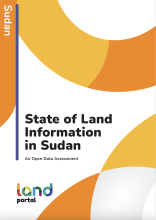Land Library Search
Through our robust search engine, you can search for any item of the over 73,000 highly curated resources in the Land Library.
If you would like to find an overview of what is possible, feel free to peruse the Search Guide.
/ library resources
Showing items 1 through 9 of 32.This study addresses the significant issue of land fragmentation in Ethiopia, which is characterized by small, irregular, scattered parcels with no or adequate road access.
Background and context
After 30 years of an authoritarian regime, Sudan reached a power-sharing deal between the military and the civilians that brought a transitional government to power in 2019. Their agenda was to lead the country towards a democratic transformation for no more than three years.
In Mozambique, the law recognizes certain forms of occupation as constituting legal tenure and nationals can claim this recognition of their right to occupy and use land allocated through customary norms/practices.
Em Moçambique, a lei reconhece certas formas de ocupação que constituem posse legal e os(as) cidadãos(ãs) podem reivindicar esse reconhecimento de seu direito de ocupar e usar a terra alocada por meio de normas/práticas costumeiras.
The Global Programme “Responsible Land Policy” (GPRLP) is part of the BMZ Special Initiative "Transformation of Agricultural and Food Systems" which aims to reduce extreme poverty and hunger. The GPRLP is implemented by GIZ and has nine country components.
This chapter traces the complex trajectory of land tenure reforms in Benin since the democratic transition and liberalisation of the economy in the early 1990s. It shows that conceptions of the problem of land tenure insecurity and the responses to it have often clashed.
Increasing investment by smallholders in agriculture and livestock is essential for improving food security, income and resilience to climate change, but can be constrained by tenure insecurity.
This report is a contribution of the knowledge management component of the LAND-at-scale programme (LAS) which is funded by the Netherlands Ministry of Foreign Affairs, and implemented by the Netherlands Enterprise Agency (Rijksdienst voor Ondernemend Nederland - RVO).








